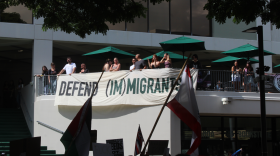Imports and exports have been front of mind this month as businesses try to make sense of President Trump's threats of tariffs.
One unlikely group that could come out on top is Hawaiʻi's farmers. That’s according to Lt. Gov. Sylvia Luke, who recently returned from a visit to the U.S. Department of Agriculture in the nation's capital. It's the second time a Hawaiʻi delegation has ever visited.
Luke spoke with HPR about why restrictions on exports could be changing under the Trump administration.
Interview Highlights
On the Trump administration's support of Hawaiʻi agriculture
LT. GOV. SYLVIA LUKE: After the new administration went in, we were going back and forth about whether we should take another delegation just to feel out the new administration and feel out what is the temperature for the new USDA secretary. And we were pleasantly surprised that we had great feedback. I know right now it's a very chaotic time for many folks dealing with the federal government, but that shouldn't prevent us or scare us from continuing to reach out to see if there are ways that we can continue to support agriculture. And just to highlight and just to make a case that, 'Hey, Hawaiʻi is still here, we can play the role of import replacement,' because a lot of times the fruits and vegetables and products that the continental U.S. are getting are out of the country. So why is it that it's okay for them to have fruits and vegetables from out of the country, but it makes it really hard for us to be able to export our fruits and vegetables to the continental U.S.?
On barriers Hawaiʻi faces in exporting goods
LUKE: We now have significant barriers on exporting our goods. And if we want to be in a place where we are looking at economic diversity and we're looking at alternative industries, we have to support our agriculture industry. There are different opportunities in the state of Hawaiʻi where we are producing, but it's the exportability and even the exportability between the islands, because of different causes or different factors that are preventing us from moving to the next step… Because of our location in the Pacific, we play a significant role for national security, basically for the support and protection of the rest of the nation, but when we look at some of the export restrictions, they're almost treating us as a territory, even if we're a state… I think there are different kinds of conversations we need to have, but we have to have those with USDA and say, 'Hey, let's step back and let's look at what you folks are trying to protect. And first of all, treat us like a state. And then let's not treat all fruits and vegetables the same way.' We have huge opportunities, and we have things that we grow in the state, including avocados, including macadamia nut, including limes, including pineapples, that should not be treated in the same way like many of the other fruits and vegetables.
On opportunities for Hawaiʻi to take on agricultural responsibilities
LUKE: We would like to have a discussion with USDA, and we have started to at least tease out some of the issues, for instance, are there opportunities? Because we know the federal government is cutting a lot of the positions. We just got a notice from the Department of Transportation that the lines at the airport are expected to be longer, only because they are anticipating that we are not going to have as many ag inspector workers. Are there opportunities where we can have discussions about if you're gonna cut some of the positions and programs, can we take on that responsibility? Or can we do a pilot out of certain islands? I always think that Kauaʻi is such a good pilot because we're dealing with limited number of people, a limited number of travelers... As opposed to going through the ag inspections, if we can do a different way, whether it's through spot check by dogs or do a random check, so that we can relieve the pressure of the reduction in force and reduction in services.
On exporting more crops
LUKE: Right now, there's basically very little conversation about what are some of the ways that we can increase exports… The continental U.S. imports 90% of limes from the world. Mahi Pono on Maui are growing a lot of limes, but for them, because they are limited in their ability to export to the U.S. market, it doesn't make economic sense for them to grow their inventory if they continue to have these restrictions with the continental U.S. If we can figure out what are some of the products that are not susceptible to our fruit flies, or there will be less infestation of fruit flies in these fruits, and then put research behind it, and then work with USDA on a pilot program, try some of these things. Let's try to do data gathering on the export side and the import side, and continue to work together on some of these issues. And I think those are the conversations that we never really had, or we had very little. But I think now, because of the focus on tariffs and because the focus, really, on import replacement, Hawaiʻi could play a role in feeding, or providing goods and services to the continental U.S. that we never really had before.
This interview aired on The Conversation on April 16, 2025. The Conversation airs weekdays at 11 a.m.






